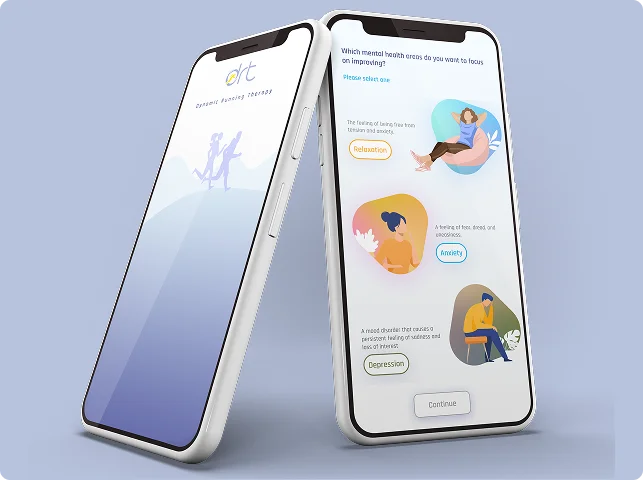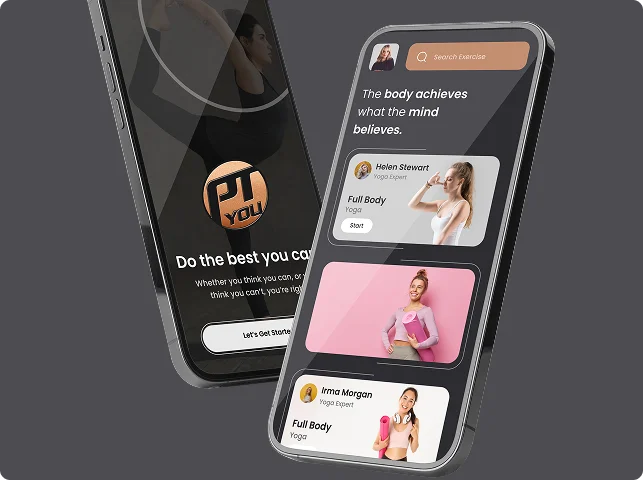
Let’s Discuss your
IDEA!
Numbers are the biggest motivators for any business. Check out some stats from the fitness app market that will help you understand the market better and decide how you plan to start your journey.

Projected Market volume by 2029, indicating exponential growth potential in the market.

Users of fitness apps around the world, offering a large pool of audiences to target.

Downloads of fitness and health-tracking apps, showing an exponential increase in userbase.

For 2024-2030 making fitness app development a growing industry for investment.
Choose from a variety of fitness app development solutions offered by our experts. We at Nimble AppGenie can help you build fitness apps catering to different types of users.

Give your user the convenience of remote training with personal trainer apps that allow a user to connect with fitness trainers, wellness coaches, personal instructors, etc. from the comfort of their smartphones.

Take digital workouts to the next level by building a dedicated fitness app for fitness enthusiasts. With our fitness app development experts, you can offer personalized workouts, performance tracking through wearables, and more.

Deliver effective nutrition plans and custom diets to your users through a one-of-a-kind solution built with cutting-edge technology to help a user stay up to date with their progress & food habits.

Offer yoga and meditation sessions through a well-designed, robust fitness application. Blending technology with peacefulness can often be challenging while developing fitness apps. However, our fitness app developers do it flawlessly.

For people who are into fitness and supplements, these apps offer insights on what type of supplements they are taking, the nutritional value of those supplements and whether they are verified or not.

These are apps that offer a social media-integrated fitness platform where people can share their daily achievements and plan their workouts together. These apps are great for generating engagement and offer great revenue potential.

Sleep is one of the most crucial parts of human lifestyle and with these apps, your user will be able to make the most of it. These apps allow sleep pattern tracking, identification of disturbances, and sleep quality analysis.

These apps function on user-fed data and can assist users in understanding what they are feeling and why they are feeling so, helping them chart their highs and lows in the day for deeper insights.

Tracking every movement you do can help you understand more about your body's strength, stamina, and fitness. Activity trackers are developed to offer insights to your users so they can work on themselves to stay healthier.
We at Nimble AppGenie take pride in all the solutions that we have delivered as they have served our clients the best. All our fitness app solutions are market-ready and can lead you straight toward success.

Identifying the need for a fitness app that caters to a diverse group and helps them take care of their physical and mental health, we deployed the DRT healthcare app for one of our clients based in the UK. The user-friendly solution developed by us offers multi-lingual support for a wider outreach.
View Case StudyPersonal training fitness apps are highly lucrative and less explored territory in fit-tech. If you plan to build your fitness app, PT You is a solution of ours that can give you insights into why choosing us can be a great decision. With integrated features for direct training and intuitive UX, it serves the purpose perfectly!
View Case Study

CUT, an e-wallet app available in China and Myanmar, supports RMB and MMK currencies and is accessible on iOS, Android, and web platforms. This free app streamlines transactions with QR code scanning for payments and personalized QR IDs for receiving money.
View Case StudyWe have a great presence on the Clutch platform and are awarded as a top mobile app development company across the globe.
Any fitness application development process requires you to identify basic and advanced features that you want to incorporate. We at Nimble AppGenie can help you choose and integrate the right features according to your vision.




















 Take Your Business to the Next Level with FitTech
Take Your Business to the Next Level with FitTech 
Upgrade your user experience with fitness app development services by our experts.
It's time to elevate your business with a tech-enabled solution.
Many fitness app solutions in the market inspire you to start one of your own. Nimble AppGenie can help you build an app like MyFitnessPal, Headspace & others, helping you penetrate the market with a boom!
Give your fitness application the flavor of hyper-personalization and curated recommendations to engage your user with AI in fitness. Our experienced AI specialists leverage AI to bring the best out of your fitness app with added features.


Workout Insights

Activity Tracking

Virtual Trainers

Workout Difficulty

Insight Visualization

Performance Metric
Choosing the correct stack of technologies to power your fitness app is nothing short of an art and when it comes to decoding tech our fitness app developers are the best artists you can find.
With a vision to make app development services accessible for all, Nimble AppGenie is on a mission to create the best fitness apps that cater to different sectors easily. We focus on building quality solutions that are robust and optimized. Our values and dedication help us stand out from the crowd. However, we believe it is our fitness app development services that make all the difference. Don't believe us, try it for yourself!

Our development team ensures that every step is carried out properly, making fitness app development agile to its core. All our methodologies are tried and tested to deliver the best results.

All our experts including developers, designers, testing professionals, and analysts are highly qualified and experienced to understand the project requirements and offer top-notch development solutions.

We understand the importance of time hence all the projects we take up, we tend to finish on or before time. With regular maintenance and timely completion of the app, we are able to build some of the finest solutions in the market.

One of the key factors that helps us stay on top of the fitness app development company chart is the fact that we have an in-house team of developers. This means your idea is intact and you get direct access to the developers.
It can take you anywhere between 3-12 months to build a fitness app. It all depends on how complex your app is and how many resources you have deployed on the same. Based on the go-to-market time you have in hand, you can negotiate the development time however it can also affect the cost of your fitness app development.
The cost of fitness app development can vary based on your requirements. Generally, it costs somewhere around $20,000 to $200,000. However, that is not the cap as there are apps that have spent over $300,000 to incorporate advanced technologies and get the best services.
We use several different techstacks to develop fitness apps for you. The selection depends on your choice and budget. We offer development with Kotlin, Flutter, React Native, AI, IoT, and more advanced technologies to build your fitness app. You can easily choose what functionalities you want implemented and accordingly, we can decide on the technology required.
Yes, fitness app development at Nimble AppGenie is available for both native and cross-platform development. You can ask the experts to help you build an app for Android, iOS or both, as per your requirements.
Yes. We have a dedicated team of experts to manage all your post-launch requirements. You can either opt for a support plan while planning the development or if you already have an app, you can reach out to us for support services to manage your app performance and optimize it for the best!
A fitness app holds personal information of the user which can often be sensitive to share. Hence we pay extra attention to security by deploying data encryption and making sure that all your data is safeguarded with proper compliance and regulations.
Depending on what features or data source you want in your application we can integrate highly efficient APIs to support your fitness application. We are one of the market leaders when it comes to API integration services so you can count on us, without hesitation.
If you approach us for custom fitness app development services with your unique idea, we ensure that your idea stays yours and sign a non-disclosure agreement.
Nimble AppGenie is committed to delivering results that satisfy our client’s needs and their business objectives. Here are testimonials from our clients about their experiences of working with us.
We hired Nimble AppGenie for web development services related to our edtech platform, Glu Learning. They integrated well with our team to solve all the problems and deliver remarkable solutions. Their team have great command of both client side and server side technology. We highly appreciate and recommend their services.
"Our journey with Nimble AppGenie is defined by their consistent availability, reliability, and efficiency. As we look towards expansion, I'm confident our partnership will grow even stronger. And we are eagerly anticipating the next chapter with them.

Read our blogs about the latest industry trends and much more inthe mobile app development industry.